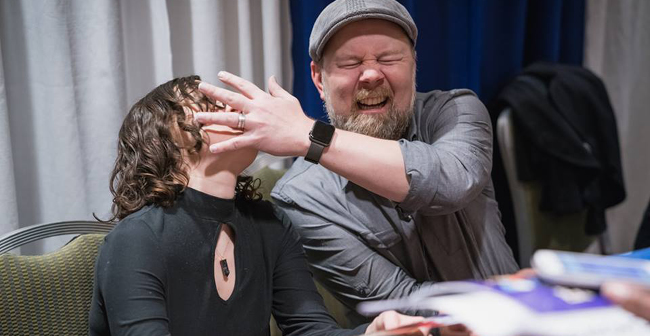Culture
 Photo: Funimation's Facebook page
Photo: Funimation's Facebook page
Sounds, Screams & Saiyans: Dragon Ball’s Christopher Sabat
June 3, 2017 @ 12:00am
Christopher Sabat wasn’t born in a state, and he loves to tell you this. “You” being fans in line at a convention, Reddit AMA-ers or even the numerous actors screeching into a microphone behind a padded sound booth. He wants you to guess, so you’ll guess wrong.
“I’m really proud to say that I was born in Washington, DC,” Sabat says. “I don’t know, it makes me feel special. I’ll say, ‘I bet you $100 you can’t guess what state I was born in.’ And I’m always right.”
Sabat’s voice was made for radio, but he’s no disc jockey. Instead he’s a Saiyan, Namek, robot and, of course, human; it just depends on what character he’s lending his distinguishable vocal cords to on that day for that script.
From June 16-18 in the Washington Convention Center, Sabat will be lending his voice and time to the attendees at Awesome Con as a featured guest.
“When I was younger, I used to connect things together.”
Though Sabat was born in the not-state of DC, he moved to Houston, Texas as a child. His father worked for IBM as a database expert, so technology was always of interest in the household. For the young kid, sounds were a cause for fascination.
“I didn’t have the Internet,” he says. “All we had were people who were around, and for me that was engineers and programmer types. I always gravitated toward audio, and that’s what drew me into working with studios. I used to connect things together. I’d go to the library and check out sound effect records. I had multiple record and tape players, and I would play them all at the same time. Acting is important, but as a director and casting guy, I’m always interested in how people sound together.”
Sabat’s infatuation with sound paid dividends, as he received a scholarship to the University of North Texas as an opera singer. Due to a rather strict regimen of not drinking and talking (basically all college kids want to do), Sabat eventually transitioned to a major in radio, television and film. While he enjoyed the switch, his undeniable success story didn’t begin with graduation.
“I had maybe 40 credits left,” Sabat says. “I got offered this job in Fort Worth, and my thought was, ‘Should I take the job or get this piece of paper?’ My parents were livid, but it ended up being the best decision of my life.”
“’You like to do voices?’ and I said, ‘yean.’”
If the words Saiyan or Namek seem familiar, it’s because the alien species belong to the Dragon Ball franchise – a manga-turned-anime about adventures with a child named Goku. At least that’s how it starts. Akira Toriyama’s creation is largely cited as almost uniquely responsible, along with Pokémon, for permanently imprinting the Japanese genre into the American pop culture zeitgeist. If you watched the Toonami block of programming on Cartoon Network from 2003 until present, you’ve likely heard him bellow as the Saiyan prince Vegeta or growl as baddie-turned-father figure Piccolo. And while Sabat’s name appears in the credits of numerous other titles, it all started with this show.
“My involvement with Dragon Ball was pure luck,” Sabat says. “I mean, I was just a 20-something dude who was smoking a lot of weed, making music and hanging out. I wasn’t concerning myself with the future of anime, and neither was Funimation at the time. They were just trying to make a popular show.”
Popular is a massive understatement. Dragon Ball has transformed and evolved with countless revitalizations over the past two decades, including successful films in Dragon Ball Z: Battle of Gods and Dragon Ball Z: Resurrection F, and a new series currently airing on Cartoon Network and Crunchy Roll titled Dragon Ball Super. Along with the growth in episode counts and video game iterations, the franchise has undeniably been immortalized by the number of people on YouTube and social media who dedicate entire channels and websites to the fandom of Dragon Ball.
“I really feel like everything has come together in this culmination of pop culture, and everything is coming back,” he says. “All these kids who were running home every day are in their 20s, have jobs and are nostalgic now. Everything that was popular is popular again.”
But how did Sabat get involved with the product? Basically, it’s another tale of “it’s not what you know, it’s who you know.”
“I had a friend, Carly Hunter, and she worked for Funimation when they had like four employees,” Sabat says. “They were just importing Dragon Ball and recording dubs in Canada. I used to joke about what she did for a living, which was take out the dirty things. She changed Master Roshi’s beer to juice, and ‘HELL’ to ‘HFIL.’”
“I love [Vegeta] for that reason. I couldv’e never played Goku – he’s too good.”
As both a director and performer in Dragon Ball, Sabat has given life to a number of cartoon characters, but his portrayal as Vegeta is easily his most identifiable and prominent. The Prince of Saiyans has gone from bonafide villain to anti-hero to loving father and husband, but his ambition to best lead character Goku has remained his rock.
“As an actor, I feel so grateful in retrospect, growing up over the past 18 years. A lot of people think Goku is the lead to the show, but oddly enough, Vegeta has the best lines, the best character development and he repeatedly does amazing things.”
Vegeta also holds perhaps the most famous catchphrase in the English version of the series with, “It’s over 9,000.” Lately, the Saiyan badass has become, well, softer. Dragon Ball Super has allowed the character to grow into a role far different from the man who came to Earth in search of immortality, destruction and revenge.
“People ask me what my favorite thing about Super is, and the answer is that it exists,” Sabat says. “Playing Vegeta for the past 18 years was like being Bill Murray in Groundhog Day. Every video game is telling the same story; every redub is the same story. I wanted something new and fresh.”
One episode of the new series features the scowling Vegeta throwing away his ever-important pride to make sushi out of a giant octopus.
“I love the octopus scene,” Sabat says. “I love his interaction with Bulma [his wife]. It’s like how a really angry person approaches these situations, you know? It’s basically what he would say.”
“Fans weren’t all that kind at the time.”
Being synonymous with a legendary TV show allows those who have sacrificed time and effort to enjoy the fruits of their labor, but the series wasn’t necessarily expected to be as successful stateside as it became. In fact, the first people to approach Sabat at conventions during those early days were detractors.
“I got to go to conventions, and I started to see fans were watching the show,” he says. “They didn’t like some of the changes that had happened. We were working on really crude equipment back then, and it was all pretty janky.”
Some of the changes fans disparaged were dialogue revisions, or mistranslations that led to inconsistencies in the story. A lot of those modifications were to help American audiences transition into fans, and some were to curb the violence and raunchy humor. These days, the series is much more faithful to the original – a fact that Sabat is proud of.
“Most of what Funimation does now is try to maintain the original essence of any property. The scripts are well-written by experienced writers who truly understand Japanese terminology. With Dragon Ball, we do that too, but part of the fun with that show is we’re sort of able to play around with subtle changes.”
At Awesome Con, Sabat won’t be jeered at, as those days are long in the past. And while most patrons will ask for mundane catchphrases he’s uttered thousands of times at countless conventions, he’ll still maintain a chuckle – and a growl.
Awesome Con will be held at the Washington Convention center on June 16-18. Tickets for the weekend are $75; day pass prices vary.
Walter E. Washington Convention Center: 801 Mt. Vernon Pl. NW, DC; 202-249-3000; www.awesome-con.com







